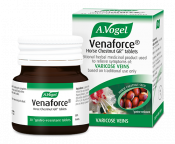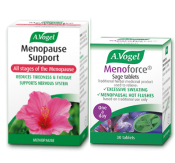Today's topic:
Today on A.Vogel Talks Menopause, I take a look at five signs that may indicate you have poor circulation.
Good circulation is very important for lots of different areas of our health. But the main thing is that it transports oxygen and nutrients to all our cells in the body. It also removes waste and toxins.
If your circulation isn't functioning particularly well, if it's a bit sluggish, then you're not going to get proper oxygenation of the cells. You're not going to get the nutrients you need to be delivered wherever they may be needed.
Poor circulation also hinders the delivery of hormones to where they are needed too. So, it's really important that our circulation is working well during menopause.
The main signs of poor circulation to be aware of:
 There are several signs that may indicate that you have poor circulation to look out for, as well as some menopause symptoms that can worsen due to poor circulation:
There are several signs that may indicate that you have poor circulation to look out for, as well as some menopause symptoms that can worsen due to poor circulation:
1. Varicose veins
Varicose veins are where the valves in the veins get really weak and as the blood goes back up to the heart, it starts to fall because of gravity, and it pushes these valves the wrong way.
The blood vessels underneath the valves can start to bulge and can start to get distorted. Poor circulation can also cause thread veins and spider veins on the legs and also in the face. And the other horrible thing that can happen is that we can end up getting haemorrhoids, which can be really uncomfortable and sometimes a little bit difficult to treat as well.
2. Cold hands and feet (not just in the winter)
You might find that even just a slight dip in temperature and your fingertips start to get really cold or your toes and feet start to get really cold.
3. Feeling tired or having a lack of energy
Less oxygen means less energy. If you're not getting enough oxygen around your body, your whole body can become fatigued. You can feel that you're lacking energy and feel more sluggish.
The other thing that can happen is that you can start to get sore muscles quickly after starting exercising or brisk walking because your muscles need plenty of oxygen for them to work well.
4. Dizziness and headaches
Dizziness can be caused by different factors and so can headaches. So, these are things that if you're getting these really regularly, please do get them checked out by your doctor first of all.
5. Poor memory
If you're not getting enough oxygen to your brain, you're going to get, again, like the fatigue, you're going to get that foggy brain and you might find that you're not as sharp as what you used to be.
Other signs to look out for:
Some other signs that you need to look out for, too, that can indicate that your circulation is not very good are things such as hardening of the arteries. It can be high cholesterol levels and it can also be heart issues. But again, these need checking out by your doctor first before you go for any self-treatment.
What can you do to help to improve your circulation during menopause?
There are lots of simple things you can do to help improve your circulation during menopause, including:
Helpful herbs
If you have symptoms such as varicose veins, thread veins, spider veins, or haemorrhoids, you can look at the herb Horse Chestnut, which can be found on our Venaforce tablets.
This is not a quick fix and it can take a few months to start to show a benefit but it's something that may be worth trying for a few months to see if it helps.
My Top Tip:

Our Venaforce® Horse Chestnut tablets are made from freshly harvested horse chestnut seeds (Aesculus hippocastanum) and are used to relieve the symptoms associated with varicose veins, such as tired, heavy legs, pain, cramps and swelling. They are best taken immediately after food, one tablet, twice daily.
"Excellent product that eases achy legs due to varicose veins."

If you're getting the cold hands and feet, if you're getting the poor memory, if you're getting the brain fog or just feeling just not quite with it all of the time, there is the herb Ginkgo biloba.
Its nickname is called the memory tree because it's used a lot in the Far East to help improve memory and that's going to help to improve circulation to the brain.
Exercise regularly
You can look at exercise. This is a great one for getting your circulation going. It doesn't need to be intensive exercise. You don't have to be running every single day. A good 10-minute brisk walk can work wonders at helping to get your circulation going.
If you're one of those who are having to spend a lot of days sitting, this can be really bad for your circulation. It can pool in your ankles and to your lower leg and your feet. So, it's really important if you're doing a lot of sitting to get up regularly and do something brisk, even for about five minutes.
Run around the building. Walk around the block. Just do some marching on the spot. Anything that's going to get your circulation going can be of real benefit in this situation here.
Eat well
This is really important. Foods, such as garlic, great for keeping the circulation going. Fruit rich in vitamin C such as oranges is very important for circulation and especially for strengthening those veins that may be a little bit weak due to varicose veins. And you can look at fish as well. That's another good one for the circulation.
Foods to avoid, are all the usual ones such as caffeine, high- sugar, and high-salt foods. Try and keep those for a minimum.
Skin brushing
You can do something called dry skin brushing. It can be very helpful, especially if for some reason, you can't do a lot of exercises. If you've got a lot of joint aches and pains, if you find that walking or exercises are just a bit too difficult for you at the minute, then the dry skin brushing can be really helpful.
All you need to do is Google 'How to do skin brushing for circulation' for the technique. It's something you would do daily, and it can also be really good for the skin. So, you're getting double benefits here.
Get you blood pressure check regularly
Make sure that you are getting your blood pressure checked regularly because, in the menopause, we do know that falling oestrogen can have quite an impact on blood pressure and if it's either too high or it's too low, then that can be something you need to watch out for. So, don't forget to do that.
My Self-Care Tip: Why you should get your blood pressure checked during menopause and how often
Watch my self-care video tip below to find out why it's important to get your blood pressure checked during menopause, including how falling oestrogen can affect it and how often you should be getting your blood pressure checked:
I hope you found this one a helpful one. Our circulation is vital for our health. And sometimes, it's just neglected that little bit during the menopause. If any of you have any tips, as usual, please do share them. We would love to read them.
Until then, take care.









